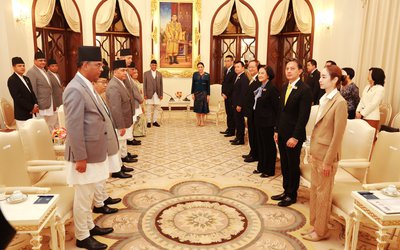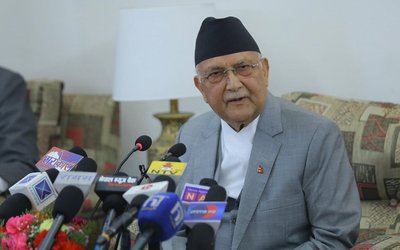More on Interview




Dr Bipin Adhikari is a well known face amongst the members of legal community in Nepal. He is also a foremost constitutional expert of the country. He has written and edited many publications including books on the constitution, human rights and public law. Adhikari has been very closely following the constitution building process at Nepal’s Constituent Assembly. Currently the chairperson of Nepal Constitution Foundation, Adhikari spoke with New Spotlight on the current hiccups in constitution making and peace process. Excerpts:
Do you see the possibility of a new constitution being enacted in the next two months?
There is always hope. However, I do not think the new constitution could be enacted if the issue of management of combatants is not solved as desired by most of the non-Maoist parties in the Constituent Assembly. There is increasing polarization in the country around this issue. There could be several other factors behind.
But why a compromise solution is so difficult on this subject?
To my knowledge, they all are ready to compromise here and there, as far as the draft constitution is concerned, but they do not want to negotiate on the combatant issue in a way that Maoists remain as armed force even after the promulgation of the constitution. What they want is - by the time the constitution is promulgated, there should not be any concept of Maoist combatants on board, and there should be no organized threat to the new constitution from any quarter. Democratic parties take it as the ideal point of departure for pursuing further democratization of the state. Some people have linked this issue with the larger issues of regional security as well.
Why cannot both the issues go hand in hand as the Maoists have been emphasizing?
In principle, if there is an environment of trust, there is no reason why this should be a problem. The dilemma is that such an environment of trust is not visible. Parties like Nepali Congress have been insisting that the key peace agreements signed with the Maoists hither to this day since the Comprehensive Peace Agreement was signed in 2006 remain to a great extent unimplemented on their part. There have been several good faith understandings from which Maoists have backed out openly. While they do not want to dismantle their combatants, others think cantonments must be cleared out first.
What are the major issues in which they are confronting each other?
It is the same issues that we read in the newspapers every morning. Maoists have problems to agree on the number of combatants to be integrated into the national security forces, and on the modalities for their integration including rank harmonization. They want parity in everything. Some of the Maoists do not seem to be happy even with the idea of establishing a Directorate under the Nepal Army on which the Maoist leadership had a favorable nod. Discussions have remained inconclusive to date.
What is the Maoist position in all these issues?
Generally, they all love the idea of having a standing army of their own. This is the psychology. You cannot help it. However, their leadership, aware of the international critiques, has always tried to assure up to certain standards. This offers space for negotiation. However, there has never been serious dialogue in exploring this space in the interest of all. Meanwhile, there are others in his team, who have very strong opinions, and have nuisance value within the party. They say that the leadership has failed, and the one who succeeds in finding a solution to external class struggle in Nepal and inner-party struggle, should lead the party. They have also demanded review in the party steering committee decision to accept the leadership of Nepal Army in the separate division to be created with the integration of combatants. This situation frightens others as to long term stability in the country.
Do you think the absence of the UN mission has created vacuum?
The UN mission had some significance for the peace process. It was like an international forum in the peace process creating space for deliberative decision making. But its role was technically limited to monitoring of compliance by the Nepal Army and the Maoist combatants with the agreement on the monitoring of the management of arms and armies. They continued round-the-clock surveillance at the Nepal Army weapons storage site in Kathmandu and the weapons storage areas in the seven main cantonment sites of the Maoist combatants. But even this moderate role of the UN mission was not tolerated by certain international sectors. I do not want to explain more.
What does the constitution say? Does it give any guidance for the remaining peace process?
The Comprehensive Peace Agreement (CPA) is a part of the Interim Constitution 2007. So it is not just an agreement between political parties, but also the fundamental law of the land. The Constitution also envisaged that the integration and rehabilitation of the Maoists combatants would be completed within six months of the formation of a new government following the 2008 Constituent Assembly election. These provisions have not been enforced. The Supreme Court is of the opinion that they are political issues, and has said that the mechanism under the CPA should handle them well. I do not think in the broader scheme of things that Nepal has been passing through there is any room for constitution and the rule of law.






